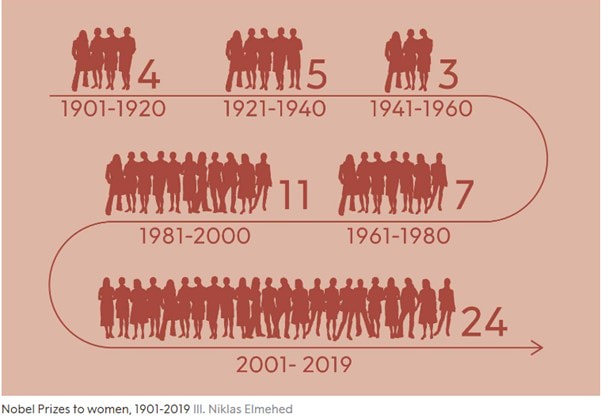|
E-tivities assist with peer learning, build effective learning pods and co-operation, and lead students towards exploring challenging issues together. It’s always worth encouraging them to diagram and visualise outcomes from their collaborative discussions – helping them to mature as learners and present complex ideas better. TITLE: How to win a Nobel prize. PURPOSE: How to win the Nobel Prize. (Also helps with your first assignment). SPARK: https://www.nobelprize.org/prizes/lists/nobel-prize-awarded-women/
https://www.bbc.co.uk/news/science-environment-54432589#:~:text=Emmanuelle%20Charpentier%20and%20Jennifer%20Doudna,DNA%20contained%20in%20living%20cells. INDIVIDUAL : Explore the awarding, to two women scientists, of the 2020 Nobel Prize in Chemistry. They developed the tools to edit DNA. Explore a bit further, find out how Nobel prizes are awarded. Find out the demographics of Nobel prizes generally. Pick one characteristic & post in the forum <link> the statistics you have found about it & one piece of valid evidence offering an explanation (150 words max plus your reference(s)). Post by Monday at 16.00 GMT. PARTICIPATION 1. Respond to at least 3 others of your peers by agreeing or disagreeing (with evidence) about their accounts or interpretations. Complete by Wednesday 16.00 GMT. 2. Meet in your groups of 4 , draw a multiple cause diagram demonstrating why there are inequalities in the awarding of Nobel prizes https://www.futurelearn.com/courses/systems-thinking-complexity/0/steps/20381. Add this to your e -portfolio ready for your assignment. And post in your <Group drive>, alerting me when it’s there. Complete by Friday 16.00 GMT., latest. INTERVENTIONS: I will give feedback on your multiple cause diagrams, Friday to Monday. SCHEDULE & TIME: 2 hours exploring Nobel prizes, the rules, the history & the statistics. At least another hour choosing one demographical element & looking at evidence for explanations or make your interpretations. 60 mins reading classmates' contributions & responding. 2 hours in your groups reminding yourselves about multiple causes in complex systems & developing an excellent diagram & posting it for review. 30 mins reading my feedback & thinking about it for your assignment. Total: Around 5.5 hours spread over one week. Your whole career to try and get a Nobel prize.
0 Comments
Your comment will be posted after it is approved.
Leave a Reply. |
AuthorFollowCategoriesArchives |

 RSS Feed
RSS Feed
